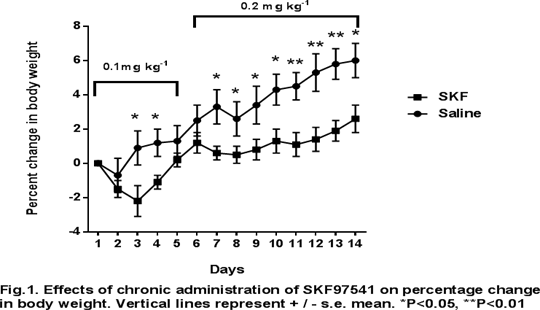Effects of chronic administration of the GABAB receptor agonist SKF97541 (3-aminopropyl(methyl)phosphinic acid) on body weight in rats.
It has previously been demonstrated that while systemic administration of the GABAB receptor agonists baclofen increases short-term food intake in non-deprived rats (1), chronic administration of the drug decreases body weight (2). More recently, it has been shown that the potent GABAB receptor agonist, SKF97541 (SKF; 3) also increases food intake (Ebenezer, this meeting). The present study, which was ethically approved,was undertaken to extend these observations and investigate the effects of chronic i.p. administration of SKF on body weight in rats. Adult male Wister rats, purchased from Harlan Laboratories, Blackthorn, UK, (starting body weights: 320 – 420 g) were divided into 2 groups and injected i.p. with either saline (Group 1, n=7), or SKF( Group2,, n=8) once daily for 14 days. During experimental days 1 to 5 the animals received SKF 0.1 mg kg-1, and 0.2 mg kg-1 for the rest of the experiment. Body weight for each rat was recorded each day prior to injection and expressed as a percentage change relative to body weight on treatment Day 1. The results are illustrated in Figure 1 and show that SKF significantly decreased body weight gain during the experimental period. On day 15, the animals were injected with either saline or SKF (0.2 mg kg-1) and 24h food intake measured, as described previously (1). Analysis of the data revealed that SKF significantly has no effect on 24h intake (The mean food intake (g) ± s.e. mean measured at 24h was as follows: Saline = 22.9±0.5g; SKF = 21.4 ±1.2g, ns). The results of the present study extend previous findings and show that chronic administration of SKF produce similar effects on body weight as those previously reported for baclofen (2). The observation that SKF has no effect on 24h food intake is consistent with the suggestion that GABAB receptor agonists may reduce body weight by increasing metabolic rate (2). These data suggest the possibility that GABAB agonists may be useful in the treatment of obesity. Further studies are warranted to investigate the mechanisms involved.
(1) Ebenezer, I.S. and Pringle, A.K. (1992) Neuropharmacol 31: 39 – 42. (2) Patel, S.M. and Ebenezer, I.S. (2010) Eur J Pharmacol. 635:129 – 134. (3) Seabrook, G.R. et al. (1990) Br J Pharmacol 101:949 – 957.
|



